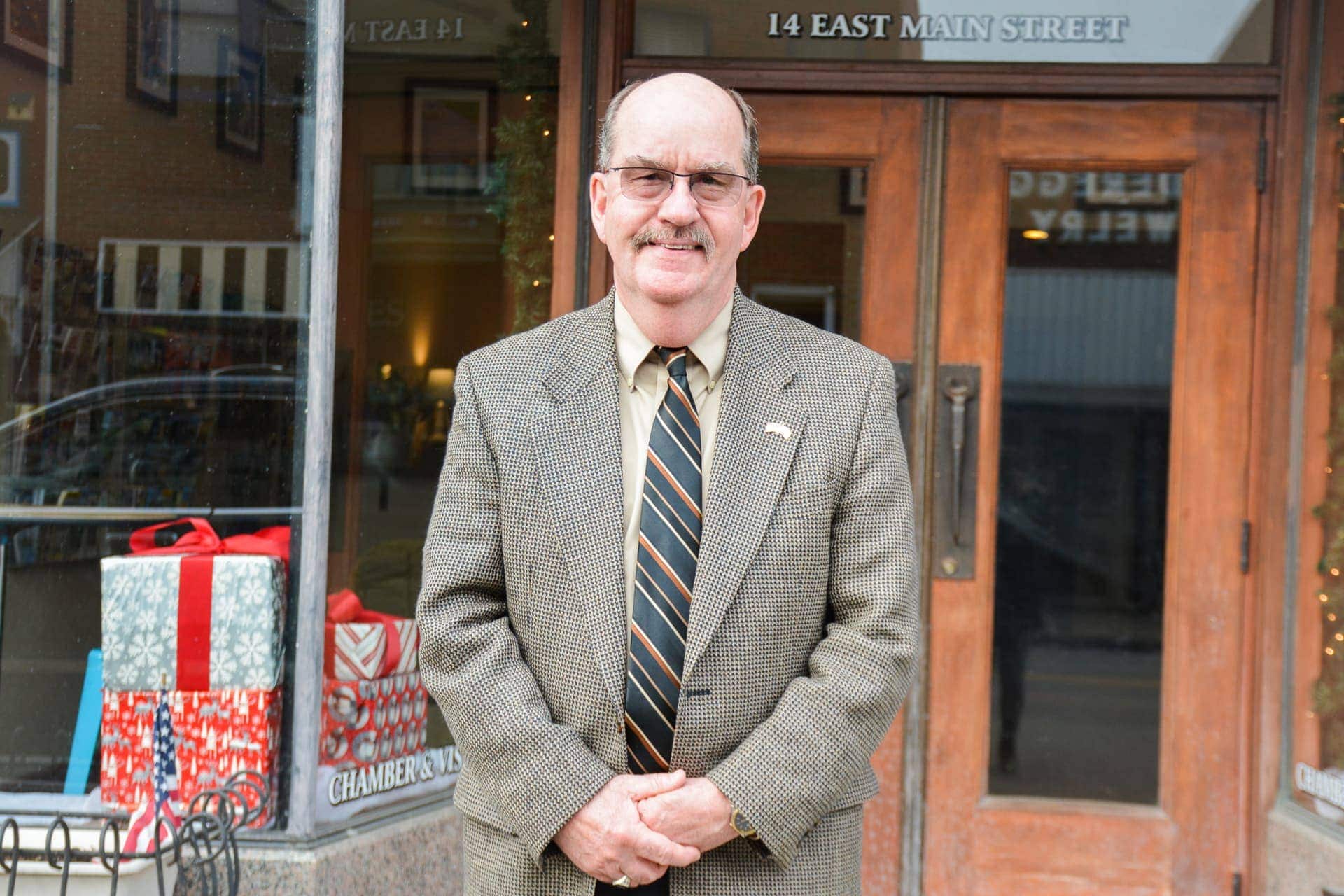BUCKHANNON – One to seven.
No, those aren’t the odds something monumental will or won’t happen in 2019.
Those numbers describe the transition Del. Bill Hamilton, R-Upshur, will be making Wednesday, Jan. 9, when he takes his oath of office and swears to do his best to represent seven counties instead of just one, Upshur.
Hamilton, who has represented the 45th District – essentially, all of Upshur County – for the past 16 years will step into a new role as senator for the 11th Senatorial District, which is comprised of Upshur, Randolph, Webster, Pocahontas, Pendleton, Nicholas and part of Grant counties.
My Buckhannon recently sat down with Hamilton ahead of the start of 2019 legislative session, which kicks off Wednesday with Gov. Jim Justice’s State of the State, to discuss, among other topics, his legislative priorities and how he believes being a senator will differ from serving as a delegate.
Hamilton, who defeated Sen. Robert Karnes in the May primary and Democrat Laura Finch in the November general election, said there’s one clear difference, and it’s in the numbers.
“I have seven counties to represent,” he said. “Before, I only had one. Before I was in a majority Republican county, which was Upshur. Now, I’m in a majority Democrat area.”
Only Upshur County and the part of Grant County Hamilton represents are red, while Randolph, Webster, Pocahontas, Pendleton and Nicholas are blue, Hamilton said.
But at the end of the day?
“Basically, it’s not going to be any different,” he said. “I’ve just got more people to represent. I went from having 18,500-and-some to having about 108,000 to 110,000 people.”
And while he’ll represent more people, Hamilton – a labor-backed Republican who has a reputation for his willingness to work across the aisle – will be one of fewer.
There are only 34 senators, 20 of whom are Republicans and 14 of whom are Democrats.
The smaller number of senators seems to lend itself to a greater amount of camaraderie.
“I noticed in the Senate, there seems like there’s a lot more camaraderie there, even among Democrats and Republicans, even though I got along great with the Democrats in the House,” Hamilton said. “I really did over the years. Even when we were in the minority, people would say, ‘How are you getting so many bills?’ and I would say, ‘Well, number one, I worked my chair in the House’ – the chair of the committee – before the bill was out to try to get it on the agenda, and then I don’t stop there. When my bill passes the House, I get over there in the Senate and work my bill there.”
Speaking of bills, Hamilton plans to sponsor or co-sponsor at least three this legislative session, and the one he’s prioritizing deals with requiring political action committees – commonly referred to as PACs – to disclose their donors.
While political candidates are required to disclose the names of individual donors, right now, the names of donors who contribute money to help elect or defeat a candidate under the umbrella of a political action committee don’t have to be disclosed.
“While I’ve got to have a report of who contributes to me, those PACs (political action committees) that people create and throw a bunch of money into, they don’t have to report who their contributors are,” the soon-to-be-senator explained. “My bill is simply going to say, ‘You’ve got to show who’s contributing to you,’ and it hits both sides of the spectrum.”
Hamilton said he doesn’t believe any group — liberal or conservative — should be granted anonymity when they donate money through a PAC.
“I don’t think unions should be able to do that,” he said. “I don’t think the Chamber of Commerce should be able to do that or business management councils or the West Virginians for Life. All these groups can create PACs, and then the money can blow in, and they don’t have to show where it’s coming from.”
“The magic word in politics today is transparency,” Hamilton added. “You’ve got to make sure it’s all transparent.”
Hamilton said he had a brush with what’s been referred to as “dark money” most recently when mailers were circulated throughout Upshur County during the May 2018 primary election, and many of them were funded by PACs.
“They had really some bad representations of my voting record,” he said. “They didn’t tell the truth. It didn’t just happen to me; a lot of the unions did that against people that they were against … and I just think we all need to play on the same field, and it’s got to be fair.”
Hamilton isn’t sure how much support that type of legislation would garner.
“I only have one senator that’s agreed to co-sponsor with me so far,” he said.

Also on Hamilton’s legislative agenda?
Passing a bill that would exempt Social Security income from the state income tax.
“There was a bill that I was on several years ago, it would take the state income tax off of Social Security income, and I was on that bill, and I’ve already got that in draft [form],” he said. “I want to run the same bill. There’s like 12 or 13 states that tax Social Security income. The rest of the states don’t tax it.”
Hamilton predicted the first question skeptics of the bill might ask is how he plans to make up for the $80 million a year in lost revenue.
He says the shortfall can be filled with money from the budget surplus as well as tax applied to internet sales.
“Right now, we’ve got a major surplus – the first one we’ve had in several years, so it can come from there,” he said.
A second source of money to make up for the hole is internet sales tax. As the result of a U.S. Supreme Court ruling in 2018, the Mountain State may now tax internet sales, even from businesses that don’t have a physical presence in the state.
“That’s supposedly going to bring in $65 or $70 million,” Hamilton said, “so we could use that. We’re the third oldest state in the nation. We have a lot of people who, when they retire, come back home and live on the family farm or what-have-you, and I think [eliminating the Social Security tax] is giving a break to people that have basically supported us.”
Finally, Hamilton plans to run a bill that would increase the surcharge on property and casualty insurance from .55 percent to 1 percent to increase money doled out to volunteer fire departments across the state.
“Right now, they’re getting somewhere around $44,000 (annually) in their departments,” Hamilton said. “I want to move the surcharge back to 1 percent, which the state fire marshal has recommended we do that.”
“There’s only so many hot dogs and bake sales you can have to produce revenue,” he added, “and if there’s anything I hate, it’s when you’re driving along to a festival, and the firemen are standing out there with a boot collecting money for their department. But if we moved that surcharge back to a dollar, it’s not going to quite double their money, but it’s probably going to put another $38,000 to $40,000 in their accounts that they can use to buy fire trucks and equipment, and take care of their classes and trainings they’ve got to go to.”
Requiring PACs to disclose their donors, removing state income tax from Social Security income and upping the property/casualty insurance surcharge to generate additional income for volunteer fire departments are Hamilton’s specific legislative priorities. However, he also believes in combating the addiction epidemic and shoring up the Public Employees Insurance Agency’s financial viability.
Hamilton said the Mountain State needs more recovery centers targeting all types of addiction.
“I think we have something like less than six in the state,” he said. “The addicts aren’t the enemy. It’s the dealers. They’re the enemy. And the only way the dealers are going to go away is if you take their customers away – put them in rehab where they can be functional.”
Pointing to an increase in homelessness and the growing number of children placed in foster care, Hamilton said the addiction epidemic is “costing every one of us.”
“The drug addiction crisis is a cost to society,” he said.
Hamilton said the climbing cost of health insurance for all West Virginians – not just those covered under PEIA – is “the gorilla in the room.”
“It’s breaking everybody’s budget, and it’s something that’s not going away,” he said. “The governor says, ‘We’ve got $100 million to put in it’ to make it solvent, but I guarantee you, in five years, we’re going to be right back in the same boat.”
“I may or may not be a senator in five years,” Hamilton added, “but someone’s going to be there, and they’ve got to quit kicking the can down the road.”
Justice will deliver his State of the State address at 7 p.m. Wednesday, Jan. 9; it will be livestreamed on the governor’s YouTube channel, Facebook page and Twitter account.
























